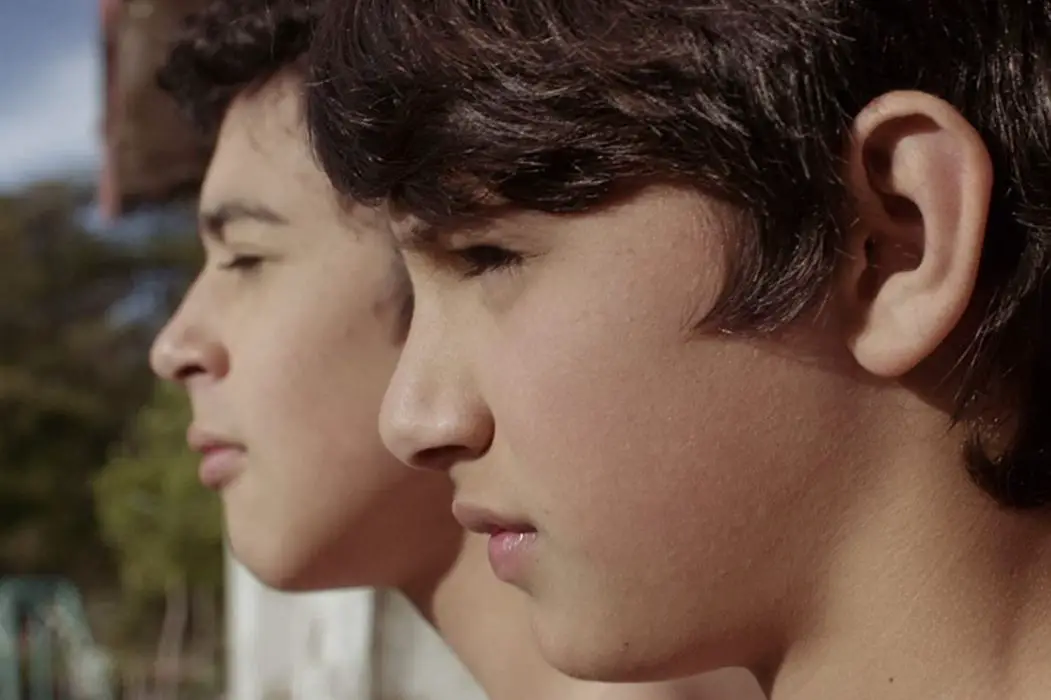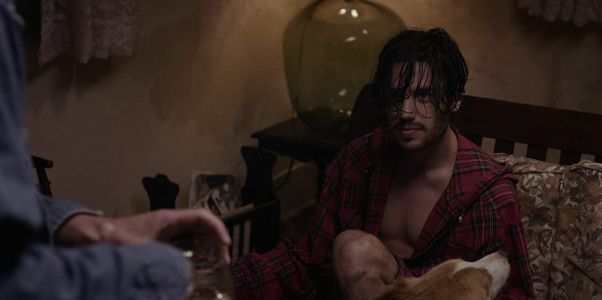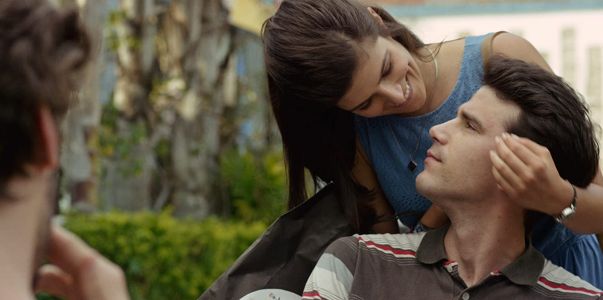Queerly Ever After #23: ESTEROS (2016)

Amanda Jane Stern is an actress, writer, and director from…
Queerly Ever After is a bi-monthly column where I take a look at LGBT+ films that gave their characters a romantic happily-ever-after. There will be spoilers.
As children, Matías (Joaquín Parada) and Jerónimo (Blas Finardi Niz) were inseparable. They played together, vacationed together, explored the estuaries of the Argentinian countryside together (the film’s title, Esteros, is Spanish for estuaries), and even discovered their sexuality together. But then, Matías’ father accepted a job in another country, moved the family away, and the boys lost touch. A decade later, an adult Matías (Ignacio Rogers) returns to Argentina with his girlfriend Rochi (Renata Calmon) for Carnivale. There, he is reunited with the now-adult, and very attractive, Jerónimo (Esteban Masturini) whom Rochi unknowingly hires to do their makeup for the festivities.

The film alternates between two different timelines, the first being when the boys were young and first falling in love, and the second being the present-day when they reconnect and their feelings reemerge. Of course, nothing’s ever simple. In the years since the boys had their sexual awakening, their lives have diverged greatly. While Jerónimo, who works in special effects in the film industry, is out and comfortable in his sexuality, while Matías, whose father was always a macho, aggressively heterosexual man, has repressed his sexuality. Not only has he repressed his sexuality, instead of pursuing the career he wants, he works for Rochi’s father in some sort of corporate, environmental job, when he’d rather be studying the estuaries. The two decide to take a weekend trip back to where it all began, Jerónimo’s family’s summer home.
Wonderful Simplicity
Overall, the story of this movie is very simple and it was certainly filmed economically. What sets it apart from other indie movies of the same sort, and I said this as well about the Dutch film Boys, is that director Papu Curotto set up every shot in advance, he blocked every scene perfectly before cameras rolled. This planning immediately elevated what is a small, simple love story into something even more.

In addition, the film was wonderfully cast, with the younger versions of both leads looking a lot like their adult counterparts, and that’s not just because each has their own color that they wear throughout the film (Jerónimo in red and Matías in blue). Curotto’s masterful direction, and well-crafted visual set-ups make this film a beautiful watch.
Nothing is Perfect
Of course, the movie is not without its flaws, and perhaps the biggest flaws can be found in Matías’ character. Yes, he has a lot of internalized homophobia to work through stemming from his macho upbringing, that’s not the problem. At times, his characters comes across as just too moody. Is it understandable? Sure, he’s fighting against his own desires by pushing away the people he loves. But what I found myself wondering throughout the film was why Jerónimo kept trying. Jerónimo is confident, self-assured, comfortable in his own skin and his sexuality.

Yes, Matías is the first guy he ever fell for, but is that enough for him now to put up with Matías’ mood swings? I think Matías still has a lot of work to do on his own before he is ready to be in a relationship with Jerónimo, or anyone else for that matter. That’s not to say that they shouldn’t end up together, I want them to end up together, I just also want Matías to be in a place where he accepts himself, and where he can be on equal footing with Jerónimo.
The argument can be made that by Matías coming out to, and breaking up with Rochi towards the end of the movie, and then kissing Jerónimo in a public place, that is his way of acknowledging self-acceptance. Is that enough though? What about when it comes to how he’ll handle telling his parents or other friends? Is he ready to do that? Or is he only willing to be out around Jerónimo’s family and friends, who are already accepting?
Esteros: In Conclusion
Esteros is a sweet, simple love story about two former lovers who reconnect as adults and discover that the feelings they had for each other never went away. While the movie is not without flaws, its simplicity is elevated by beautiful cinematography and production value.
Esteros was released theatrically in the US on November 18, 2016. For all other release dates, see here. It is available on VOD and streaming on Tubi, Vudu, Realeyz, Youtube, Google Play and iTunes.
Does content like this matter to you?
Become a Member and support film journalism. Unlock access to all of Film Inquiry`s great articles. Join a community of like-minded readers who are passionate about cinema - get access to our private members Network, give back to independent filmmakers, and more.
Amanda Jane Stern is an actress, writer, and director from New York City. She received her BA in Film, Television & Interactive Media and Theater Arts from Brandeis University. She loves regaling whomever will listen with her endless lists of fun facts and knowledge of film history. Follow her on twitter and instagram @amandajanestern













